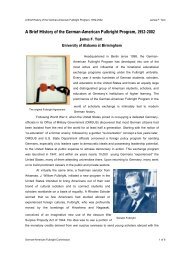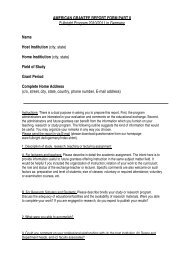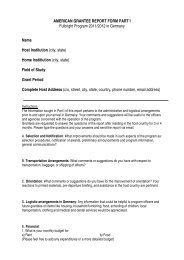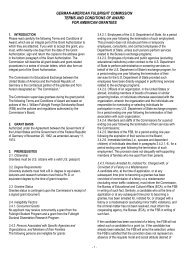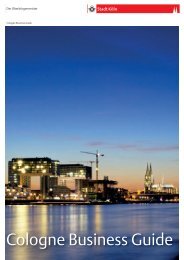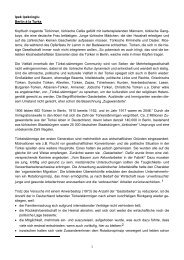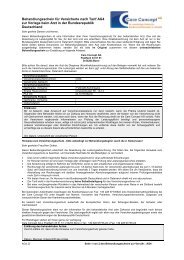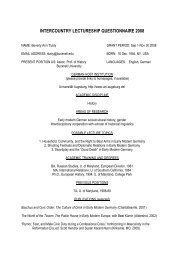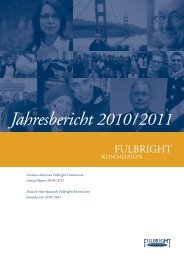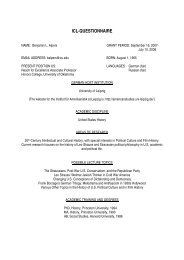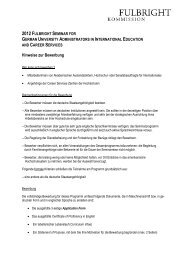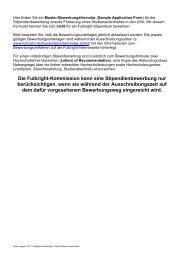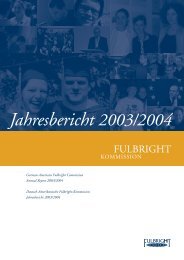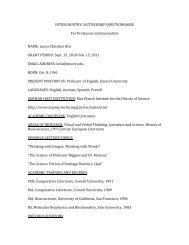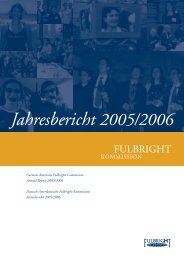The First Class of Fulbrighters - Fulbright-Kommission
The First Class of Fulbrighters - Fulbright-Kommission
The First Class of Fulbrighters - Fulbright-Kommission
Create successful ePaper yourself
Turn your PDF publications into a flip-book with our unique Google optimized e-Paper software.
<strong><strong>Fulbright</strong>ers</strong> visit a refugee camp in Eastberlin.<br />
text and immediately asked the first person in the first row<br />
to “read and translate.” Katastrophe! What to do? I had had<br />
Latin, <strong>of</strong> course. Primarily classical Latin. And now medieval<br />
Latin to be read and translated sight unseen into German. I<br />
was in the middle row in a class <strong>of</strong> 21 students. When it<br />
came to my turn I requested a reprieve as a <strong>Fulbright</strong> student<br />
until I could adjust. <strong>The</strong>re was a smile and consent. I<br />
could sense the feelings <strong>of</strong> the others: an American student.<br />
<strong>The</strong> following session I was in the last row. Next to me sat a<br />
student, Karl Graach, who had had a minimum <strong>of</strong> seven<br />
years <strong>of</strong> Latin. He became my tutor and good friend. Pr<strong>of</strong>essor<br />
Bisch<strong>of</strong>f was very polite in his approach. He began every<br />
session with the student following the last reading and<br />
translation. <strong>The</strong> session almost invariably covered no more<br />
than five pages. It was thorough. After a number <strong>of</strong> weeks<br />
and after Karl and I had prepared the requisite number <strong>of</strong><br />
pages I told Pr<strong>of</strong>essor Bisch<strong>of</strong>f that I would participate. I<br />
knew I was in trouble when I observed his smile. He sped<br />
up the reading and translating so that when it came to me I<br />
had to do the text sight unseen. I passed. But what an experience!<br />
Most rewarding was my experience with the medieval<br />
institute, the Monumenta Germaniae Historica, housed in a<br />
building that today accomodates the general management <strong>of</strong><br />
the Bavarian State Picture Gallery. In 1953 it was a center<br />
for art restoration. I have fond memories <strong>of</strong> Dr. Opitz as<br />
director. <strong>The</strong> work area was small and intimate and we were<br />
a small group. Probably because the building housed valuable<br />
paintings, security was at a premium. One had to show<br />
a pass upon entering as well as leaving. At lunch the greeting<br />
was always Mahlzeit.<br />
One would be remiss if one were to omit cultural<br />
Munich. Munich was a city <strong>of</strong> music, opera, theater and<br />
museums. <strong>The</strong>re was every opportunity to enjoy concerts,<br />
opera, and theater as well as visit museums. By joining the<br />
<strong>The</strong>atergemeinde tickets were available at extremely reduced<br />
prices. And we did attend opera performances, concerts, and<br />
visited museums.<br />
<strong>The</strong>re were also many good restaurants at reasonable<br />
prices. One restaurant deserves special mention. We fondly<br />
remember the Augustiner restaurant with not only its good<br />
food, but the funsters Beppo Franz and his musical group.<br />
We were also able to travel because there was ample time<br />
between the winter and summer semesters. <strong>The</strong> “albatross”<br />
now became a chariot. On occasion, the Fetzers, Mabel and<br />
John, joined us. We went to Switzerland, the Austrian Tyrol<br />
and Arlberg, Salzburg, and Vienna. <strong>The</strong> highway between<br />
As if the<br />
apartment<br />
weren’t cold<br />
enough,Wittke<br />
and his wife<br />
Bert visit Jenner<br />
Peak, Austria.<br />
Salzburg and Vienna was strictly controlled. Special permission<br />
was required. <strong>The</strong>re were checkpoints en route. We also<br />
experienced a Vienna divided into sectors and learned that it<br />
was strictly forbidden to enter the Russian sector.<br />
<strong>The</strong>re were also trips to northern Germany and Denmark,<br />
the Netherlands and Alsace-Lorraine, and the<br />
Schwarzwald. A memorable trip was Italy after Christmas.<br />
Fourteen days, demi-pension from Munich to Sicily, and all<br />
for the remarkable base cost <strong>of</strong> $125 for two.<br />
Berlin was perhaps the most significant place we visited.<br />
<strong>The</strong> <strong>Fulbright</strong> Commission made possible a visit in June <strong>of</strong><br />
1954. We traveled via night train from Frankfurt am Main<br />
to the East German border with drawn shades. At the border<br />
we cheated, we peeked and saw the heavily armed guards, it<br />
was the same when we arrived in Berlin.<br />
In Berlin one could see first hand the destruction as the<br />
result <strong>of</strong> the bombings and the Russian conquest. <strong>The</strong> report<br />
was that one sixth <strong>of</strong> all the rubble in Germany was in<br />
Berlin. Entire city blocks were nothing but rubble. <strong>The</strong>re<br />
were visits to East Berlin, especially Alexanderplatz, and to a<br />
refugee camp where we distributed fruit and chocolate to the<br />
youngsters. We visited the famed Berlin cabarets and<br />
enjoyed Berlin night life. I have been to Berlin many times<br />
since, perhaps twenty-five. I have seen Berlin before the<br />
Wall, during the Wall, and after the Wall.<br />
A concluding activity was the workshop conference conducted<br />
by the Columbus Gesellschaft in conjunction with the<br />
American Consulate General and the UNESCO Institute held<br />
June 24-25, 1954 in Gauting. It was a good session, summarizing<br />
a number <strong>of</strong> aspects <strong>of</strong> student life and activities.<br />
One other memory. I happened to be in the area <strong>of</strong> the<br />
University when it was announced that Germany had won<br />
the World Cup. <strong>The</strong> hordes <strong>of</strong> people in the streets made it<br />
almost impossible to get to the Bahnh<strong>of</strong>. Wahnsinnig!<br />
A note on language. <strong>The</strong> setting: <strong>The</strong> Kurgarten in Bad<br />
Honnef. Sunny afternoon. Beer and wine. Waitresses went<br />
from table to table crying “Käsestengel!” 4 One <strong>of</strong> our<br />
Fubrighters asked why they were paging “Casey Stengel.”<br />
He also wanted to know why they kept saying “Danke<br />
Fieldmouse.” 5<br />
In conclusion, I can only repeat and emphasize what was<br />
stated in the opening paragraphs. <strong>The</strong> <strong>Fulbright</strong> program<br />
was perhaps the most important influence in forming our<br />
future. I attribute my career in great part to the opportunities<br />
made possible by the <strong>Fulbright</strong> program. For that, many<br />
thanks to the late Senator <strong>Fulbright</strong>, to Mrs. <strong>Fulbright</strong>, and<br />
to the <strong>Fulbright</strong> Commission.<br />
1) Economic miracle 2) a landmark cliff along the Rhine 3) Coal for the stove 4) Cheese sticks 5) Danke vielmals – thank you very much



